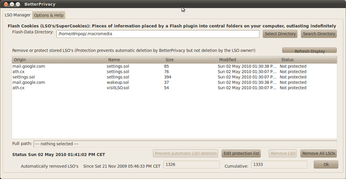Beef up Firefox Privacy Features

Productivity Sauce
Whether you want it or not, your Web activities are tracked and analyzed in many different ways. But you don't have to put up with this, especially if you are using Firefox as your primary browser. There are a few handy Firefox extensions that can beef up your favorite browser's privacy features. Here are my three personal favorites.
Besides regular cookies planted in your browser by many Web sites, some services add so-called Flash cookies or Local Shared Objects (LSO). Similar to conventional cookies, LSOs collect and share information about your Web usage. But unlike good old cookies, LSOs are particularly difficult to purge from your browser. The aptly named BetterPrivacy extension provides a simple fix to that problem. This extension lets you nuke all nasty LSOs installed in your browser one by one, or you can configure it to delete them all in one fell swoop when you close the browser.
Cookies are the most common way to track your Web activities, but they are not the only ones. Tags, Web bugs, pixels, and beacons are all used to gather information about your Web habits. The Ghostery extension is designed to block these unwelcome guests. Once installed, it sits quietly in Firefox's status bar. When Ghostery detects suspicious elements, its icon turns blue, and you can view a list of discovered trackers by right-clicking on the icon. You can then use Ghostery to view more info about the particular tracking service and block it, if necessary.
Most Web sites and services that attempt to gather information about you are small fish compared to the mighty Google. Every time you perform a search or use a Google-based service, you hand the search giant a wealth of information about you. While it's virtually impossible to prevent that from happening, you can make Google's job of collecting data much harder using the GoogleSharing extension and proxy service. According to the project's Web site, the proxy server is designed to confuse Google by "generating a pool of GoogleSharing 'identities,' each of which contains a cookie issued by Google and an arbitrary User-Agent for one of several popular browsers." The Firefox extension redirects all requests for Google services from your browser to the proxy. The proxy then strips the requests of all identifying information and replace it with information from a GoogleSharing identity. By default, the extension uses the proxy server maintained by the GoogleSharing project, but you can also set up your own proxy by installing and running the googleshare server.
Comments
comments powered by DisqusSubscribe to our Linux Newsletters
Find Linux and Open Source Jobs
Subscribe to our ADMIN Newsletters
Support Our Work
Linux Magazine content is made possible with support from readers like you. Please consider contributing when you’ve found an article to be beneficial.

News
-
Fedora 42 Available with Two New Spins
The latest release from the Fedora Project includes the usual updates, a new kernel, an official KDE Plasma spin, and a new System76 spin.
-
So Long, ArcoLinux
The ArcoLinux distribution is the latest Linux distribution to shut down.
-
What Open Source Pros Look for in a Job Role
Learn what professionals in technical and non-technical roles say is most important when seeking a new position.
-
Asahi Linux Runs into Issues with M4 Support
Due to Apple Silicon changes, the Asahi Linux project is at odds with adding support for the M4 chips.
-
Plasma 6.3.4 Now Available
Although not a major release, Plasma 6.3.4 does fix some bugs and offer a subtle change for the Plasma sidebar.
-
Linux Kernel 6.15 First Release Candidate Now Available
Linux Torvalds has announced that the release candidate for the final release of the Linux 6.15 series is now available.
-
Akamai Will Host kernel.org
The organization dedicated to cloud-based solutions has agreed to host kernel.org to deliver long-term stability for the development team.
-
Linux Kernel 6.14 Released
The latest Linux kernel has arrived with extra Rust support and more.
-
EndeavorOS Mercury Neo Available
A new release from the EndeavorOS team ships with Plasma 6.3 and other goodies.
-
Fedora 42 Beta Has Arrived
The Fedora Project has announced the availability of the first beta release for version 42 of the open-source distribution.


Dump the flash trash as son as it arrives
ln -s /dev/null ~/.macromedia
ln -s /dev/null ~/.adobe
Cleaning up
http://bleachbit.sourceforge.net/
firefox & flash history, cookies, etc.
function clean-firefox ()
# from a slashdot post, cleans up its databases, can take ~15 secs!
{
for i in ~/.mozilla/firefox/*.default/*.sqlite; do
sqlite3 $i "vacuum;" ;
done
}
alias cleanflash='rm -rf ~/.macromedia/Flash_Player/macromedia.com/support/flashplayer/sys/* ~/.macromedia/Flash_Player/#SharedObjects/*/*'